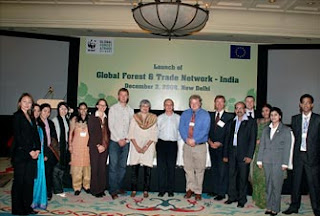Global Forests & Trade Network ( GFTN )
Every year, more than 30 million acres of natural forest are destroyed to meet the growing global demand for wood and agricultural products. In order to ensure that some of the world's most valuable and threatened forests do not face uncontrolled exploitation due to this growing demand, the Global Forest & Trade Network, a WWF led program, was established. The GFTN links companies, NGOs and entrepreneurs in more than 30 countries across the world with the goal to create a new market for environmentally responsible forest products.
Since 1991, market-driven demands from GFTN participants have increased the economic incentives for responsible forest management. This is helping to ensure that millions of acres of forests are independently and credibly certified, a guarantee that the forests are well managed and that their products come from legal and sustainable timber harvests. The GFTN exists to support and facilitate greater coordination of national and regional efforts to expand responsible and credibly certified forest management, including technical assistance throughout the certification process and enhanced marketing opportunities.GFTN participants
Since 1991, market-driven demands from GFTN participants have increased the economic incentives for responsible forest management. This is helping to ensure that millions of acres of forests are independently and credibly certified, a guarantee that the forests are well managed and that their products come from legal and sustainable timber harvests. The GFTN exists to support and facilitate greater coordination of national and regional efforts to expand responsible and credibly certified forest management, including technical assistance throughout the certification process and enhanced marketing opportunities.GFTN participants
are committed to increasing the availability of forest products from well managed forests, helping each other benefit and profit from sustainable forest management, and ending the purchase of forest products from illegal and controversial sources.
GFTN India started in 2008 and is a part of the global alliance, established with the objective of promoting and facilitating environmentally, economically and socially sound forest conservation and management practices in India. GFTN-India aims to raise awareness and promote environmentally responsible production, consumption, trade and procurement policies and practices in forest goods and services while fostering a socio-cultural environment that demands mainstreaming of sustainable forestry into business practices. GFTN-India reflects WWF-India's commitment towards sustainable forest management and minimizing forest footprint.
GFTN India started in 2008 and is a part of the global alliance, established with the objective of promoting and facilitating environmentally, economically and socially sound forest conservation and management practices in India. GFTN-India aims to raise awareness and promote environmentally responsible production, consumption, trade and procurement policies and practices in forest goods and services while fostering a socio-cultural environment that demands mainstreaming of sustainable forestry into business practices. GFTN-India reflects WWF-India's commitment towards sustainable forest management and minimizing forest footprint.



Comments
Post a Comment